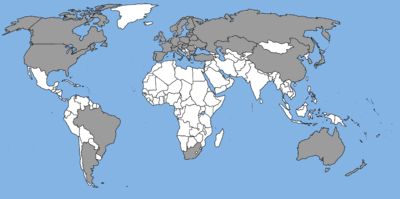- Nuclear Suppliers Group
-
Nuclear Suppliers Group (NSG) is a multinational body concerned with reducing nuclear proliferation by controlling the export and re-transfer of materials that may be applicable to nuclear weapon development and by improving safeguards and protection on existing materials.
Contents
History
It was founded in 1974 in response to the Indian nuclear test earlier in that year. The test demonstrated that certain non-weapons specific nuclear technology could be readily turned to weapons development. Nations already signatories of the Nuclear Non-Proliferation Treaty (NPT) saw the need to further limit the export of nuclear equipment, materials or technology. Another benefit was that non-NPT and non-Zangger Committee nations, then specifically France, could be brought in.
A series of meetings in London from 1975 to 1978 resulted in agreements on the guidelines for export, these were published as INFCIRC/254 (essentially the Zangger "Trigger List") by the International Atomic Energy Agency. Listed items could only be exported to non-nuclear states if certain International Atomic Energy Agency safeguards were agreed to or if exceptional circumstances relating to safety existed.
The name of the "London Club" was due to the series of meetings in London. It has also been referred to as the London Group, or the London Suppliers Group.
The NSG did not meet again until 1991. The "Trigger List" remained unchanged until 1991, although the Zangger list was regularly updated. The revelations about the Iraqi weapons program following the first Gulf War led to a tightening of the export of so-called dual-use equipment. At the first meeting since 1978, held at the Hague in March 1991, the twenty-six members agreed to the changes, which were published as the "Dual-use List" in 1992, and also to the extension of the original list to more closely match the up-to-date Zangger list. A regular series of plenary meetings was also arranged as was the regular updating of the two key lists.
Members
Initially the NSG had seven members: Canada, West Germany, France, Japan, the Soviet Union, the United Kingdom, and the United States. In 1976-77, membership was expanded to fifteen with the admittance of Belgium, Czechoslovakia, East Germany, Italy, the Netherlands, Poland, Sweden, and Switzerland. Germany was reunited in 1990 while Czechoslovakia broke up into the Czech Republic and Slovakia in 1993. Twelve more nations joined up to 1990. Following the collapse of the Soviet Union a number of former republics have been given observer status as a stage towards future membership. China became a member in 2004. The European Commission participates as an observer. The 2009/2010 NSG Chair is Hungary.[1]
As of 2009[update] the NSG has 46 members:[2]
- Argentina
- Australia
- Austria
- Belarus
- Belgium
- Brazil
- Bulgaria
- Canada
- China
- Croatia
- Cyprus
- Czech Republic
- Denmark
- Estonia
- Finland
- France
- Germany
- Greece
- Hungary
- Iceland
- Ireland
- Italy
- Japan
- Kazakhstan
- Latvia
- Lithuania
- Luxembourg
- Malta
- Netherlands
- New Zealand
- Norway
- Poland
- Portugal
- Romania
- Russia
- Slovakia
- Slovenia
- South Africa
- South Korea
- Spain
- Sweden
- Switzerland
- Turkey
- Ukraine
- United Kingdom
- United States
Future Memberships
During a state visit to India in November 2010, U.S. President Barack Obama announced U.S. support for India's membership in the Nuclear Suppliers Group, the Wassenaar Arrangement, the Australia Group and the Missile Technology Control Regime, "in a phased manner," and to encourage the evolution of regime membership criteria to that end, "consistent with maintaining the core principles of these regimes."[3][4][5]
During a visit to India in December 2010, French President also expressed his country's backing for India's inclusion in Nuclear Suppliers Group.[6]
Role in India-US nuclear agreement
In July 2006, the United States Congress amended U.S. law to accommodate civilian nuclear trade with India. A meeting of NSG members on 21–22 August 2008 on an India-specific exemption to the Guidelines[7] was inconclusive. Several member countries, including Austria, Switzerland, Norway, Ireland, and New Zealand, expressed reservations about the lack of conditions in the proposed exemption.[8] In another meeting on September 6, 2008, the NSG members agreed to grant India a "clean waiver" from its existing rules, which forbid nuclear trade with a country which has not signed the Nuclear Non-Proliferation Treaty (NPT). The NSG's decision came after three days of intense U.S. diplomacy.[9] The approval was based on a formal pledge by India stating that it would not share sensitive nuclear technology or material with others and will uphold its voluntary moratorium on testing nuclear weapons. The pledge was contained in a crucial statement issued during the NSG meeting by India outlining the country's disarmament and nonproliferation policies.[10]
References
- ^ http://www.nuclearsuppliersgroup.org/Leng/03-member.htm
- ^ Nuclear exports NUCLEAR SUPPLIERS GROUP.
- ^ "Obama seeks expanded India-US trade". Al Jazeera English. 6 November 2010. http://english.aljazeera.net/news/asia/2010/11/2010116132349390763.html. Retrieved 7 November 2010.
- ^ "Obama in Mumbai Calls India Market of the Future". Voice of America. 6 November 2010. http://www.voanews.com/english/news/Obama-Calls-For-More-Trade-with-India-106817488.html. Retrieved 7 November 2010.
- ^ FACT SHEET: U.S.-INDIA PARTNERSHIP ON EXPORT CONTROLS AND NON-PROLIFERATION, The White House, Office of the Press Secretary, November 8, 2010.
- ^ India and France hold key nuclear talks, December 6, 2010
- ^ Text of U.S. NSG Proposal on India
- ^ Nuclear suppliers propose terms for U.S.-India deal
- ^ NSG waiver enables member states to provide India full civil nuclear cooperation
- ^ Thirty words that saved the day
External links
Categories:- Nuclear weapons
Wikimedia Foundation. 2010.

